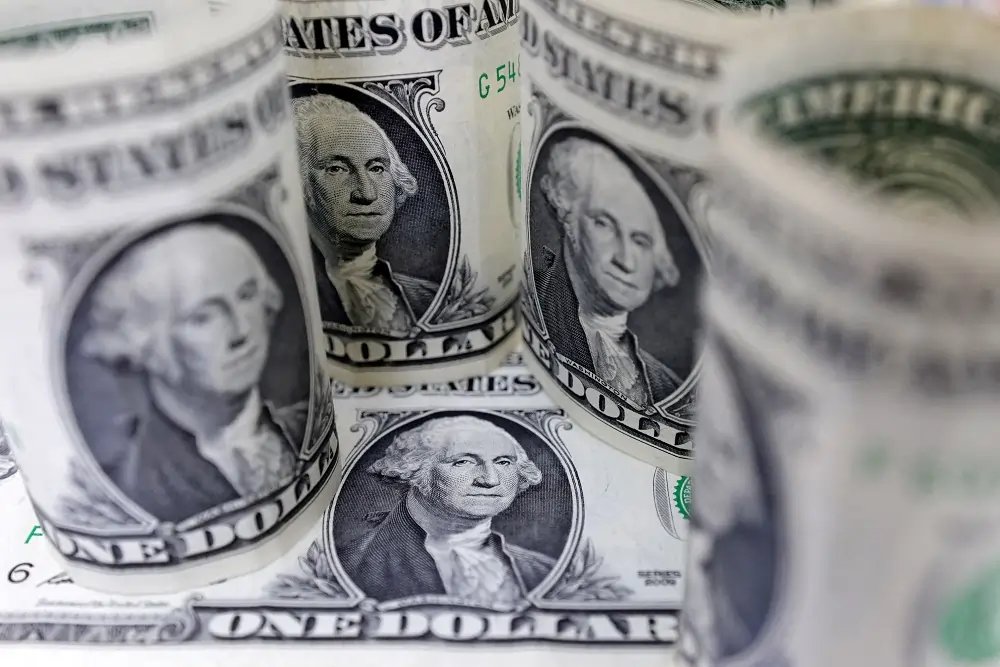Dollar jumps, yen weakest since 1990 after strong U.S. retail sales


By Karen Brettell
NEW YORK (Reuters) – The dollar reached its highest since early November against a basket of currencies on Monday, and sent the yen to its lowest level since 1990, after U.S. retail sales increased more than expected in March.
Retail sales rose 0.7% last month and data for February was revised higher to show sales rebounding 0.9% instead 0.6% as previously reported. Economists polled by Reuters had forecast retail sales, which are mostly goods and are not adjusted for inflation, rising 0.3% in March.
The greenback has gained as still sticky inflation and still strong growth leads investors to push back expectations on when the Federal Reserve is likely to begin cutting rates. The U.S. central bank also now expected to make fewer cuts than previously.
“U.S. data just keeps coming better and better than expected,” said Brad Bechtel, global head of FX at Jefferies in New York.
Traders are now pricing in fewer than two 25 basis points cuts by year-end, after previously expecting three.
New York Fed President John Williams said on Monday that Fed policy was in a good place and remained restrictive, adding that his own view was that interest rate cuts would likely begin this year.
The Japanese yen in particular has suffered from U.S. dollar strength and the large interest rate differential between the two countries.
Japanese monetary officials have ramped up warnings that they may intervene to shore up the currency. Finance Minister Shunichi Suzuki said on Monday he was watching currency moves closely, repeating that Tokyo is “fully prepared” to act.
Bechtel sees any potential intervention as more likely if the yen is underperforming, rather than during episodes of broad-based dollar strength.
“I think we still need a big day of yen really underperforming the market by 1% or more,†he said, adding that Japanese officials might also step in at a key level such as 155.
The dollar was last up 0.69% against the Japanese currency at 154.32.
The dollar index reached 106.16, the highest since Nov. 3, and was last up 0.07% at 106.03.
Investors are also focused on escalating tensions in the middle east, which if they worsen are likely to benefit the safe haven U.S. dollar and Swiss franc.
President Joe Biden warned Prime Minister Benjamin Netanyahu the U.S. would not take part in a counteroffensive against Iran, an option Netanyahu’s war cabinet favors after a mass drone and missile attack on Israeli territory, according to officials.
The euro was little changed against the dollar at $1.0643.
It recorded its biggest weekly percentage drop since late September 2022 last week as the European Central Bank left the door open to a rate cut in June.
The pound strengthened 0.22% to $1.248.
In cryptocurrencies, Bitcoin fell 1.64% to $66,035. It reached $61,323 on Saturday, the lowest since March 20.
(Reporting By Karen Brettell; Editing by Alex Richardson)
Foreign exchange, or forex, refers to the global marketplace for trading national currencies against one another. It is the largest financial market in the world, where currencies are bought and sold.
Interest rates represent the cost of borrowing money or the return on savings, expressed as a percentage. They are influenced by central bank policies and economic conditions.
Inflation is the rate at which the general level of prices for goods and services rises, eroding purchasing power. Central banks monitor inflation to adjust monetary policy.
Explore more articles in the Top Stories category











